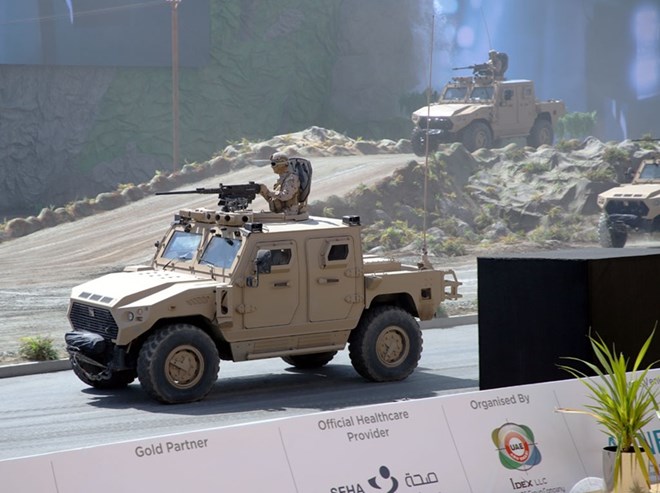Copyright hiiraan

Hiiraan Online Today from Hiiraan Online: Somali Music advertisements UN links UAE to weapons transfers fueling wars in Sudan and Somalia FacebookFacebook messengerTwitterWhatsAppLinkedInTelegramEmail Tuesday October 28, 2025 A Nimr Ajban 447A Multi-Role Armoured Vehicle (MRAV) is displayed during a defense exhibition in Abu Dhabi, United Arab Emirates. The Emirati-manufactured vehicle, produced by the UAE’s state-owned Edge Group, has featured prominently in UN investigations into arms transfers across conflict zones in Sudan and the Horn of Africa. CRDIT/ EDR Magazine MOGADISHU (HOL) — The United Nations has accused the United Arab Emirates of breaching international arms embargoes after investigators traced British-made military equipment sold to the Gulf state to militia groups operating in Sudan, Somalia, and Libya. A report presented to the UN Security Council and reviewed reveals that UK-manufactured weapons and components, including small-arms targeting systems and engines used in Nimr Ajban armored vehicles, were recovered from positions held by Sudan’s paramilitary Rapid Support Forces (RSF). The group has been accused of war crimes and genocide during its ongoing war against Sudan’s national army. Reports indicate that Emirati-manufactured Nimr Ajban military vehicles, powered by British-made Cummins engines, have been documented in both Libya and Somalia, two regions previously affected by UN arms restrictions. However, Somalia’s federal government is no longer subject to an arms embargo after the UN Security Council lifted restrictions in December 2023 under Resolution 2714. A separate embargo remains in place for the militant group al-Shabaab under Resolution 2713. UN experts said the diversion of such equipment poses a “serious risk” to regional stability and could further fuel conflicts in states under long-standing arms restrictions. Photographs and dossiers submitted to the UN indicate that vehicles built by the UAE’s state-owned Edge Group and powered by British-made Cummins engines were captured from RSF forces in Khartoum and Omdurman. “Earlier reports documented the same Nimr vehicles in Libya and linked them to militia groups in Somalia and other conflict zones under arms-transfer scrutiny. The Emirati government has denied providing arms to the RSF or other militias, while the UK’s Foreign, Commonwealth and Development Office said it maintains “one of the world’s most robust export control systems,” assessing every license for diversion risk. The conflict in Sudan, now in its third year, has killed more than 150,000 people and displaced over 12 million, creating one of the world’s worst humanitarian crises. Sudan has accused the UAE of arming the RSF through routes that include Somalia and Chad. In May 2025, Khartoum filed a case at the International Court of Justice alleging Emirati complicity in genocide, though the case was dismissed for lack of jurisdiction. On August 29, 2025, Somalia’s government denied speculation that consecutive visits by UAE and Sudanese delegations to Mogadishu were connected, illustrating the sensitivity surrounding regional claims that Somalia had been used as a conduit for weapons transfers. Earlier investigations and satellite analysis revealed that the UAE has constructed and expanded a network of military and intelligence facilities along the Somali coast, including in Berbera and Bosaso, without authorization from Mogadishu. The bases, according to UN experts, serve as logistical hubs for operations across the Gulf of Aden and provide the UAE with deep regional reach. Previous reporting shed light on the Emirates’ growing presence in Puntland, where satellite images showed fortified hangars, radar installations, and ammunition depots built adjacent to the Bosaso International Airport. The site overlaps with the Puntland Maritime Police Force, a UAE-trained unit previously criticized by the United Nations for bypassing Somalia’s federal command structure. In April 2025, it was also revealed that an Israeli-made ELM-2084 radar system, part of the Iron Dome family, was installed near Bosaso Airport under a secret arrangement between Abu Dhabi and Puntland authorities. Regional analysts told HOL that the radar’s strategic purpose may extend beyond countering Houthi drone attacks from Yemen, potentially enabling broader surveillance and logistical operations across the Horn of Africa and into Sudan. Somalia’s relations with the UAE have fluctuated over the past decade, alternating between cooperation and suspicion. Although Mogadishu has welcomed Emirati funding for infrastructure and counterterrorism operations, federal officials have consistently voiced concern over Abu Dhabi’s direct dealings with regional authorities in Puntland and Somaliland, viewing them as challenges to national sovereignty. Despite growing international concern, the British government continued to issue arms export licenses to the UAE, including for training systems and vehicle components, even after the UN raised warnings in 2024. Between 2015 and 2024, London approved at least 26 licenses for military training devices and related equipment destined for the Emirates. Mike Lewis, a former member of the UN Panel of Experts on Sudan, said the UK government has a legal obligation to prevent exports where there is “a clear risk of diversion or use in international crimes.” He added that Security Council investigators have documented the UAE’s “decade-long pattern” of supplying weapons to forces in embargoed states. Opinion| Privacy Policy|Sports|Somali Music|Somali Map All Rights Reserved Copyright. © 1999-2025, www.hiiraan.com



